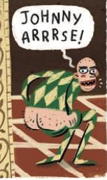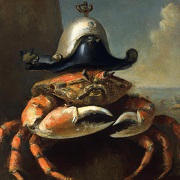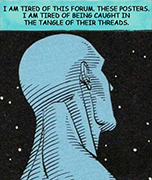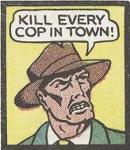|
Welcome earthlings to the Awful Book of the Month! In this thread, we choose one work of Resources: Project Gutenberg - http://www.gutenberg.org - A database of over 17000 books available online. If you can suggest books from here, that'd be the best. SparkNotes - http://www.sparknotes.com/ - A very helpful Cliffnotes-esque site, but much better, in my opinion. If you happen to come in late and need to catch-up, you can get great character/chapter/plot summaries here.  For recommendations on future material, suggestions on how to improve the club, or just a general rant, feel free to PM me. For recommendations on future material, suggestions on how to improve the club, or just a general rant, feel free to PM me.  Past Books of the Month [for BOTM before 2014, refer to archives] 2014: January: Ursula K. LeGuin - The Left Hand of Darkness February: Mikhail Bulgalov - Master & Margarita March: Richard P. Feynman -- Surely You're Joking, Mr. Feynman! April: James Joyce -- Dubliners May: Gabriel Garcia Marquez -- 100 Years of Solitude June: Howard Zinn -- A People's History of the United States July: Mary Renault -- The Last of the Wine August: Barbara Tuchtman -- The Guns of August September: Jane Austen -- Pride and Prejudice October: Roger Zelazny -- A Night in the Lonesome October November: John Gardner -- Grendel December: Christopher Moore -- The Stupidest Angel 2015: January: Italo Calvino -- Invisible Cities February: Karl Ove Knausgaard -- My Struggle: Book 1. March: Knut Hamsun -- Hunger April: Liu Cixin -- 三体 ( The Three-Body Problem) May: John Steinbeck -- Cannery Row June: Truman Capote -- In Cold Blood (Hiatus) August: Ta-Nehisi Coates -- Between the World and Me September: Wilkie Collins -- The Moonstone October:Seth Dickinson -- The Traitor Baru Cormorant November:Svetlana Alexievich -- Voices from Chernobyl December: Michael Chabon -- Gentlemen of the Road CURRENT: Three Men in a Boat (To say nothing of the Dog!) by Jerome K. Jerome This one's a real favorite of mine and I'm honestly surprised I hadn't already made it a BOTM by now. Basically the Victorian-era novelization of this: https://www.youtube.com/watch?v=R7yfISlGLNU It's free on kindle here: http://www.amazon.com/Three-Men-Boat-Jerome-Klapka-ebook/dp/B004UJL1KK First chapter (and, well, the rest of it too) free online in-browser here: http://www.readbookonline.net/read/2463/11546/ quote:Three Men in a Boat (To Say Nothing of the Dog) published in 1889, is a humorous account by English writer Jerome K. Jerome of a two-week boating holiday on the Thames from Kingston upon Thames to Oxford and back to Kingston. The book was initially intended to be a serious travel guide,[1] with accounts of local history along the route, but the humorous elements took over to the point where the serious and somewhat sentimental passages seem a distraction to the comic novel. One of the most praised things about Three Men in a Boat is how undated it appears to modern readers – the jokes seem fresh and witty even today.[2] Selected quotes: quote:THERE were four of us - George, and William Samuel Harris, and myself, and Montmorency. We were sitting in my room, smoking, and talking about how bad we were - bad from a medical point of view I mean, of course. quote:I called for the cheeses, and took them away in a cab. It was a ramshackle affair, dragged along by a knock-kneed, broken-winded somnambulist, which his owner, in a moment of enthusiasm, during conversation, referred to as a horse. I put the cheeses on the top, and we started off at a shamble that would have done credit to the swiftest steam-roller ever built, and all went merry as a funeral bell, until we turned the corner. There, the wind carried a whiff from the cheeses full on to our steed. It woke him up, and, with a snort of terror, he dashed off at three miles an hour. The wind still blew in his direction, and before we reached the end of the street he was laying himself out at the rate of nearly four miles an hour, leaving the cripples and stout old ladies simply nowhere. For a review: # 25 on the Guardian's list of 100 Best Novels. quote:An ancient river. The journey upstream of some impressionable young men into a mysterious, challenging interior. An inevitable reckoning at the source. Finally, the terrible return to reality. Here, surely, is pre-Edwardian English fiction at its classic finest. About the Author Jerome Klapka Jerome (2 May 1859 – 14 June 1927) was an English writer and humourist, best known for the comic travelogue Three Men in a Boat (1889). Other works include the essay collections Idle Thoughts of an Idle Fellow (1886) and Second Thoughts of an Idle Fellow; Three Men on the Bummel, a sequel to Three Men in a Boat; and several other novels. Discussion, Questions & Themes: This isn't an especially "literary" book but it's still worth discussing, apart from just being funny; if nothing else, it's an interesting slice-of-life perspective on Victorian society. It's a genre nobody really writes any more -- the travelogue -- which has mostly been replaced by TV shows. (There's a through-line connecting this book with Ricky Gervais' An Idiot Abroad, in more ways than one). Pacing This one's short. Just Read, Then Post. References and Further Reading Some people around here may have read sci-fi author Connie Willis's books -- she's won eleven Hugo awards and seven Nebulas. Her novel To Say Nothing of the Dog, which won both the Hugo and Lcous awards in 1999, is essentially a long extended time-travel riff on the events, style, and tone of Three Men in a Boat. Final Note: If you have any suggestions to change, improve or assess the book club generally, please PM or email me -- i.e., keep it out of this thread -- at least until into the last five days of the month, just so we don't derail discussion of the current book with meta-discussion. I do want to hear new ideas though, seriously, so please do actually PM or email me or whatever, or if you can't do either of those things, just hold that thought till the last five days of the month before posting it in this thread. Thanks, and I hope everyone enjoys the book! Hieronymous Alloy fucked around with this message at 05:40 on Jan 4, 2016 |
|
|
|
|

|
| # ? Apr 19, 2024 01:25 |
|
If you do decide to get the Project Gutenberg edition, please note that it (and possibly other free ebook editions) don't have the final section, a Christmas ghost story. It's a fairly good conclusion to the book as a whole, if we look at it as a depiction of the tail end of Victorian England.
|
|
|
|
Effectronica posted:If you do decide to get the Project Gutenberg edition, please note that it (and possibly other free ebook editions) don't have the final section, a Christmas ghost story. It's a fairly good conclusion to the book as a whole, if we look at it as a depiction of the tail end of Victorian England. I honestly didn't know that existed. Link? I've read two different physical editions, plus ebook variants, and I've never seen any chapter like that! See this sort of thing is why BOTM is worth doing
|
|
|
|
Hieronymous Alloy posted:I honestly didn't know that existed. Link? I've read two different physical editions, plus ebook variants, and I've never seen any chapter like that! It seems that the edition I had as a kid had the short story "Christmas Eve in the Blue Chamber" appended to it, without noting this in the contents. Damnably, the first 250 results on Amazon don't show this edition at all, and it's long since fallen apart. EDIT: Actually, looking further, it bound together Three Men in a Boat with the collection of short stories Told After Supper, of which the full text can be found here: http://www.fullbooks.com/Told-After-Supper.html. But, weirdly, Project Gutenberg only has an audio recording. Leaving aside the editorial weirdness of binding the book with anything other than its sequel, of course. mod edit: I fixed the trailing period in your url Somebody fucked around with this message at 14:08 on Jan 4, 2016 |
|
|
|
|
That does seem to be a very odd combination, yes. I have it bundled with the whatsitsname sequel about Germany, don't think I've ever seen it with anything else. This book, I feel, is a decisive victory of style over substance - travelogues generally try to hook readers with promises of interesting and peculiar locales and it's hard to imagine a more boring premise for one than boating in Victorian England. There's really no story past a bunch of vaguely connected episodes, there's no character development, there's no promise of it ever going anywhere fulfilling. But. But it's just too drat funny. The point I'm clumsily trying to come to here is the message I'd like to think it conveys: finding the extraordinary in the mundane. Looking out into the grey, boring a world and seeing past it, spotting all those absurd little details that form the big picture - and laughing at them. It's a very warm, friendly, relaxing book. Something I'd love to curl in front of a fireplace with. If I, y'know, had a fireplace.
|
|
|
|
|
There are very few things where I find it very hard to imagine that someone might not enjoy something. There are few things that get anywhere close to being even slightly universal; but the story of Uncle Podger trying to put up a painting is one of them.
|
|
|
|
Hieronymous Alloy posted:This isn't an especially "literary" book but it's still worth discussing, apart from just being funny; if nothing else, it's an interesting slice-of-life perspective on Victorian society. It's a genre nobody really writes any more -- the travelogue -- which has mostly been replaced by TV shows. (There's a through-line connecting this book with Ricky Gervais' An Idiot Abroad, in more ways than one). Yeah: https://en.wikipedia.org/wiki/Three_Men_in_a_Boat_%28TV_series%29 I don't think they have a dog though.
|
|
|
House Louse posted:Yeah: https://en.wikipedia.org/wiki/Three_Men_in_a_Boat_%28TV_series%29 I don't think they have a dog though. No aspect of this makes sense, but especially not the five sequels Replicating the actual trip itself might be the silliest thing possible. Or was that the point? Unless they re-enacted the pineapple tin scene. Did they re-enact the pineapple tin scene?
|
|
|
|
|
Here is a good blog post about the book with pictures of the spots on the river that they visit. http://beholdthestars.blogspot.com/2015/02/three-men-in-boat-to-say-nothing-of-dog.html
|
|
|
|
|
Hieronymous Alloy posted:Some people around here may have read sci-fi author Connie Willis's books -- she's won eleven Hugo awards and seven Nebulas. Her novel To Say Nothing of the Dog, which won both the Hugo and Lcous awards in 1999, is essentially a long extended time-travel riff on the events, style, and tone of Three Men in a Boat. I actually reread that recently, and the protagonists of this book make a cameo appearance in Willis's book.
|
|
|
|
Hieronymous Alloy posted:No aspect of this makes sense, but especially not the five sequels I don't think they re-enacted it like that! Just three blokes rowing about and saying/doing more or less humorous things.
|
|
|
House Louse posted:I don't think they re-enacted it like that! Just three blokes rowing about and saying/doing more or less humorous things. OK I will watch sounds good
|
|
|
|
|
I read this some time ago, after first reading "To Say Nothing of the Dog" and wondering what it was inspired by. This is a great book and quite timeless. I'm just wondering: was the novel's succes because of the harsh criticism? I.e. people read it because it was everything the critics disliked?
|
|
|
Walh Hara posted:I read this some time ago, after first reading "To Say Nothing of the Dog" and wondering what it was inspired by. This is a great book and quite timeless. Good question and I don't know the answer but I suspect it was the other way around -- critical backlash against a non traditional but very popular work. I mean honestly this book shouldn't work at all. Silly putty has more structure and organization. It's just so funny it doesn't matter.
|
|
|
|
|
I could spend the next 150 pages quoting this book beginning to end, but there is one particular bit that had me giggling and weeping hysterically to myself when I was supposed to be working at my desk. If you haven't read the book, don't read what follows. It doesn't work as well out of context and spoils a huge punchline. If you have, there might not be much point in reading again, now that I think about it, but goddamnit here you go:quote:I rather pride myself on my packing. Packing is one of those many things that I feel I know more about than any other person living. (It surprises me myself, sometimes, how many of these subjects there are.) I impressed the fact upon George and Harris, and told them that they had better leave the whole matter entirely to me. They fell into the suggestion with a readiness that had something uncanny about it. George put on a pipe and spread himself over the easy-chair, and Harris cocked his legs on the table and lit a cigar. Jerome K Jerome and Flann O'Brien may be the finest crafters of insults in the English language. Eugene V. Dubstep fucked around with this message at 01:23 on Jan 6, 2016 |
|
|
|
Sat down and read the whole thing over the course of an afternoon. Just barely made it to the end when my tablet's battery ran down. It is striking how modern much of the work feels. Back in the Boy Scouts I had the misfortune of experiencing a situation not unlike that encountered in one of Mr. Jerome's anecdotes. I was in a troop organized out of the local Presbyterian church; quite literally so organized (was the troop), as by some quirk of the typical cyclical leadership patterns familiar to the organization (the Boy Scouts) all Scoutmasters were engineers by trade. My arrival in the troop was borne out mostly by proximity; that is, of all the roads that might lead the son of a Catholic physician into the machinations of Anglican engineers, this one happened to be the shortest, and as Thomas More would readily vouch if time and Henry VIII had permitted far from the least pleasant. That is not to say that I did not have my clashes, given that I did not have that advantage other boys did. My own father had no more interest in the outdoors than I did, though he did prove better at avoiding them. Troops are sorted into patrols, or at least ours were. Contact with wilder troops at summer camps convinced me that this was a universal and not a particular trick of delegation devised by my troopmates' fathers, but I cannot discount that lads some campsites distant possessed no such affiliations. I had after all been informed at one particular trip to Sid Richardson that a lake of some size existed, but was never able to confirm the existence of water beyond that from a hose which I employed a time or two in order to shower and clean the latrine simultaneously; an industrious move arising of some conflict seeing as I was, if nothing else, as decadent in my need for the former as I was prone to the fits of shame common to my faith. Back to the matter of the patrols. Boys were grouped by age, one to two patrols per year. By coincidence I found myself in Raven patrol, and in the five years of our continued existence I say with some roguish pride that we never lived up to the cleverness of our namesake. We were as fanciful storytellers as one could expect of the Star Wars genre novels and Insane Clown Posse albums we were familiar with, and in matters respecting the preparation of beverages we were as peerless explorers as any alchemists of the Qin Emperor; our results were roughly as vivifying. At cooking we were dismal failures, forgetting to pack as many ingredients in the sturdy wooden box (no doubt the work of someone's father, but definitely not mine) as we employed. But we could prepare bacon at least, or some suitably convincing approximation of it. Now at the time environmental consciousness was not as it has become since, but it had long been the policy of the Boy Scouts to avoid litter. So it got into Nate's head one day through the prior day's admonishment by his father that merely pouring out bacon grease was unacceptable. He thought on the matter as long as any member of Raven Patrol ever had and resolved to immolate the grease by straining it through a tower of burning coals. To Nate's credit the grease was entirely disposed of, taking only some of his eyebrows with it. If the eight foot flames were meant to dissuade the remainder of us from reusing Nate's method, Mother Nature had not well accounted for the mischief of boys. The good news it that while our troop did at one point burn down part of a forest, we Ravens were blameless in that specific incident. Active malice against the campsite was well beyond our capabilities, as the Scoutmasters long knew, and we were not even suspects. Now regarding Mr. Jerome's tale, and my similar situation. It was the general practice of the troop to travel out to the campsite on Friday evenings after school and work and set up that evening for the remainder of the weekend, breaking camp on Sunday to travel home. Under normal circumstances we arrived in time enough to have daylight on our side; but in the case of a late start, a distant campsite, or an especially ornery solstice, we might be forced to encamp in the dark. On this particular weekend it had been all three, with a sprinkling of rain along the way to emphasize the point. It was pitch dark when we arrived, and the patrols scattered with varied enthusiasm to stake out prime locations. How they were able to discern any such thing is quite beyond me, but I will remind you that I was in Raven Patrol. We of course, being both slow and incompetent, found ourselves stumbling into ground which seemed to have a distinct muddy atmosphere, and I thought that wouldn't do. Unfortunately, the Scoutmasters were unable to discern that my motives arose from only the highest sense of practicality, confusing it (as students of mechanics and not the humanities often did) for simple laziness. Set up something right the first time or don't set it up at all, that's the way I have always seen it; not at all is preferable, but once is tolerable and twice or more simply unthinkable. All the same, the Scoutmasters urged us to set up with all haste, assuring us over our objections that complaining about our circumstances would do us little merit. Though I again pointed out that our chosen site seemed rather too outdoorsy character-building exercises prevailed and we attempted to pitch our tents. The personal sleeping tents were easy enough, though the squishiness of the bottoms did not endear me as much as I might have expected. Terrain which might prove conforming as I slept did little to comfort me, as in addition to the personal tents we were required to pitch a six-posted central tent for our provisions. I have heard it said that more legs provide greater stability, but any benefit that may have arisen from such a design proved itself fatally flawed given the terrain. We did eventually manage to secure the tent in an acceptably Raven fashion and turned in to sleep. The next morning we discovered to our consternation that Raven Patrol's campsite was the only muddy one, located as it was in a shallow sinkhole basin looser than the ground elsewhere in the campsite. Chastised by the Scoutmasters, we were forced to relocate. Of course this I chalk up to their backgrounds, assuming that the fundamental state of one campsite would serve as a baseline for the rest; but I cannot discount the possibility that the woods were as annoyed by us Ravens as the Scoutmasters generally were. In the end I proved the first, and also only, member of Raven Patrol to receive the rank of Eagle Scout, and also the only one to be kidnapped in the middle of the night in such a manner as to ensure not a soul came to justice for the deed. But that is a ritual of which I will not speak, largely because I do not remember it, despite being a tantalizing diversion. This book is a lot like that, except much better because it has a dog and drinking. One thing that makes the humor in the book so strikingly modern is the way it adheres to (or maybe creates?) a lot of the core elements of what became 20th Century British comedy. In form it's a sort of Victorian pub crawl, a bunch of lads deciding to do something poorly thought-out and experiencing the exact consequences they could have anticipated from it. Part of what makes it funny - and British - is that the consequences are anticipated, and generally dismissed. And then they happen anyway, which anyone with any sense could've predicted. That play to common sense in the face of idiocy adds a sort of smug dramatic irony for the reader because they saw it coming a mile off, but there's always that undercurrent that maybe the reader and their friends would be exactly as stupid. These are the kind of guys who bribe the wrong train to save ten minutes, propose cooking meals they don't know how to prepare, and knock off to take the train home for dinner rather than finish their epic boat journey up and down the Thames, and I can relate to all of that. So yeah, there's not really a coherent narrative going on here, but on the other hand who hasn't aborted a nice tight narrative arc in their lives to gently caress off for food or a drink? There's a theme (as much as the book has one) of bullshitting and corner-cutting being pretty universal to everyone in the Victorian age. The self-deprecation and hypocrisy in the story carry it and keep everyone from looking like assholes (or at least make them look like amusing assholes, another rather British thing). The narrator/author's admission of his packing faults has been mentioned, but there are a ton more. For example, his repeated admission that he really doesn't like working, but does like "helping": quote:Now, I'm not like that. I can't sit still and see another man slaving and working. I want to get up and superintend, and walk round with my hands in my pockets, and tell him what to do. It is my energetic nature. I can't help it. One chapter features the narrator speaking proudly about trolling steam launches with their smaller boat by getting in their way, slowing them down, and pretending they can't hear their horns and shouting. Some chapters later they're towed by a friend's steam launch and of course we get: quote:The run would have been more delightful still, if it had not been for a lot of wretched small boats that were continually getting in the way of our launch, and to avoid running down which, we had to be continually easing and stopping. quote:No, there would be too many of them! It would be the houses that he had never entered that would become famous. "Only house in South London that Harris never had a drink in!" The people would flock to it to see what could have been the matter with it. There's also a lot of slapstick, which is kind of odd coming from a book, but it makes sense that written physical comedy fell out of style with the introduction of movies and TV. A lot of scenes are dependent on the clumsiness or general bumbling of the protagonists, or on people they mention. The Uncle Podger story is a joke-for-joke script identical to something from Vaudevillian physical comedy and the slapstick films that took from it, and I wouldn't be shocked if there was a direct line of inspiration from Jerome to those acts. It kind of reminds me of an Edgar Wright film, where the premise is an occasionally-relevant excuse to shepherd along a bunch of idiots who wouldn't get anything done if they didn't have at least a vague notion of a goal, while throwing up a bunch of remarkably mundane obstacles that end up hilarious because of the protagonists' complete lack of competence and preparation to handle them. "Dumb people with bad plans do something and it doesn't work out, and then something even worse happens" is a simple formula, but it works every time. Sprinkle in a number of observations that are fairly basic comedy ("And what's up with nobody swimming at the beach?") that end up kind of working as historical artifacts, and it definitely paints a different picture of an age that we tend to view as being uptight. But guys like this have existed in every age and have given exactly as much of a poo poo, which makes me feel a bizarre kinship to the lazy dumbasses who have preceded me. And it made a shitload of money, because it turns out people can't resist a bunch of blokes drinking a lot and getting up to shenanigans, and it's only about a hundred pages long. It's everything a travelogue at its best should be: Insightful, (vaguely) informative, and full of colorful anecdotes that tell as much about the person writing it as the places they're visiting. Finally: I admit he caught me with Montmorency in the first chapter because I only got confused about why there were four of them given the title toward the end of it and didn't realize he (Montmorency) was the dog until he (Jerome) made it explicit in the second chapter. What a dick.
|
|
|
|
It was one of my favourite humour books - and one of the first ones I (unsuccessfully) attempted to read in English - until a couple of years ago I decided to reread it, and discovered that all the jokes were better in my memory than in the book. Even the part about bringing friend's cheese by train, which was the bit I would previously have probably named as the single best comedy scene I'd ever read. It was a shame. So, I'm probably not going to reread Three Men on the Bummel, to let it stay hilarious in my memory - but if you liked this one, I do recommend giving the sequel a go.
|
|
|
Burning Rain posted:It was one of my favourite humour books - and one of the first ones I (unsuccessfully) attempted to read in English - until a couple of years ago I decided to reread it, and discovered that all the jokes were better in my memory than in the book. Even the part about bringing friend's cheese by train, which was the bit I would previously have probably named as the single best comedy scene I'd ever read. It was a shame. Did you read it first in German? How do you feel about comic songs? The humor is so dry and so British I imagine it could be hard to translate.
|
|
|
|
|
Wow, I'd been meaning to read this for years and just got around to finishing it last week. Great book. The only thing I had to look up was the term 'Margate niggers', who were apparently seaside blackface performers.
|
|
|
Crashbee posted:Wow, I'd been meaning to read this for years and just got around to finishing it last week. Great book. Yeeeeaaahh I kinda forgot about that line. Chalk it up to accurate depiction of the Victorian era.
|
|
|
|
|
I read Connie Willis' To Say Nothing of the Dog years ago, and I've always meant to read this. Delighted to find I can do so for free since I'm trying to cut down on book buying while increasing book reading.
|
|
|
|
Hieronymous Alloy posted:Did you read it first in German? How do you feel about comic songs? It was in a Latvian translation, and I don't remember anything about the comic songs, sorry. When I reread it English, I did notice quite a few things that had passed me by in my early teens, but in part it was also because there are things you don't notice at that age. Still, I loved it, so I would recommend reading it in a translation if the original English prose seems too difficult for you.
|
|
|
|
On rereading this, I found myself really liking the musings about how commonplace godawful and kitschy "pieces of art" become valuable relics later on, since that's a key plot point in To Say Nothing Of The Dog. I wonder what came first, the chicken or the egg, here - although I believe it's not a first time travel story by Connie Willis. As for the Gilbert and Sullivan songs, I originally read the book in Czech and there it was just translated literally with no sense of meaning and context so the joke was really just in how bad Harris is at singing this thing although we have no idea how it's funny. You could say the translators pulled a reverse Slossen Boschen.
|
|
|
|
|
It's such a wonderfully readable book. With the exception of Wodehouse I usually find comic novels wear out their welcome by the end, but it never happens with 3 Men in a Boat. Maybe the way they abruptly end their trip is Jerome's own acknowledgment of that. I think this is my favourite exchange in English literature: quote:George and I gazed all about. Then we gazed at each other.
|
|
|
|
I dunno how you chaps feel about audio versions of your BOTMs but I can no longer read excerpts from this book without hearing Hugh Laurie's voice. Pretty sure I got it off iTunes.
|
|
|
Nakar posted:Sat down and read the whole thing over the course of an afternoon. Just barely made it to the end when my tablet's battery ran down. It is striking how modern much of the work feels. Back in the Boy Scouts I had the misfortune of experiencing a situation not unlike that encountered in one of Mr. Jerome's anecdotes. I was in a troop organized out of the local Presbyterian church; quite literally so organized (was the troop), as by some quirk of the typical cyclical leadership patterns familiar to the organization (the Boy Scouts) all Scoutmasters were engineers by trade. Thanks for posting that! I feel like I know this BotM has been a success now if it's inspiring those kinds of posts. quote:One thing that makes the humor in the book so strikingly modern is the way it adheres to (or maybe creates?) a lot of the core elements of what became 20th Century British comedy. In form it's a sort of Victorian pub crawl, a bunch of lads deciding to do something poorly thought-out and experiencing the exact consequences they could have anticipated from it. Part of what makes it funny - and British - is that the consequences are anticipated, and generally dismissed. And then they happen anyway, which anyone with any sense could've predicted. That play to common sense in the face of idiocy adds a sort of smug dramatic irony for the reader because they saw it coming a mile off, but there's always that undercurrent that maybe the reader and their friends would be exactly as stupid. These are the kind of guys who bribe the wrong train to save ten minutes, propose cooking meals they don't know how to prepare, and knock off to take the train home for dinner rather than finish their epic boat journey up and down the Thames, and I can relate to all of that. These were some really insightful points too -- I hadn't made the connection to vaudeville before and I think it's valid.
|
|
|
|
|
Oh, I need suggestions for next month. Based on what's been working for the past few months, "free on kindle" seems to be a BIG draw for these threads, so a few suggestions from paging back through my kindle history: Xenophon's Anabasis (I've tried to sell this to folks here before but it's never won the votes. It's the oldest war story around and the basis of a hundred modern movies and adaptations (right down to The Warriors). It's also true.) Alice's Adventures in Wonderland / Through the Looking-Glass / Wizard of Oz or some other children's book Island of Dr. Moreau / The Invisible Man or some other HG Wells Riders of the Purple Sage by Zane Grey (early, classic pulp western. We could also do The Virginian) Homage to Catalonia by Orwell (free for those of you outside the U.S.) You Can't Win by Jack Black (crime narrative, inspiration to William Burroughs) Any others?
|
|
|
|
|
Homage to Catalonia is great, but I think most people have already read it (maybe?). I'd go in for a pulp western!
|
|
|
|
Western sounds pretty interesting, it's a genre I never really had any interest in reading (unless McCarthy counts) so there's going to be some first contact. Anabasis sounds good too.
|
|
|
|
|
How about mixing it up with some short stories? Guternberg has collections of H.G. Wells and Wodehouse, as well as some essays by George Orwell.
|
|
|
|
Don Marquis's archy and mehitabel? Not free though, alas.
|
|
|
|
I'm on a history kick, I could join for Anabasis.
|
|
|
|
I did it. I made it in under the deadline with three hours and forty nine minutes to spare. I read this book. With the consensus being "okay done" by the fifth of the month I found it hard to sit down and dedicate any incremental effort towards its completion, feeling like I couldn't dip back into the thread until I hit footnotes. Every bump in the thread was like being nagged. The kindle version did this annoying thing where every subchapter would say a line and not delineate it from the actual first sentence of the chapter with italics or a carriage return so I'd constantly trip over an incomprehensible grammar mixup. I became convinced it was a joke that the narrator goes out of his way to never identify himself. Only today did I catch Harris calling him J. I thought montmorrency was the 3rd man in the boat until maybe the 15th of January. The plot takes a dark turn at 86%. Wasn't expecting that. I greatly enjoyed the comic songs fuckup where Harris couldn't keep the Gilbert & Sullivan songs straight, or remember the words. I love some Gilbert & Sullivan and hearing the music always fills me with the impression I could word for word the song like old times and then I'm repeating the introductory verse ad nauseum and can't seem to get to the next bit. "The fuckin guy, he was an office boy. It's a song about his life. Why is he an office boy again?" I asked myself while trying to sing it in the shower to prove harris was an idiot. I owned myself so hard.
|
|
|
|
Hieronymous Alloy posted:Oh, I need suggestions for next month. Warlock by Oakley Hall
|
|
|
|
Hieronymous Alloy posted:
... Anyways, I've recently re-read Three on a Bummel (a tour of Europe / Germany). Reviews tend to rate it a lot lower than TMiaB - less cohesive, and who really cares about places that aren't in England - but I thought the ruminations about Europe, the German national character and the like highly fascinating. These people have no idea that WWI is almost at hand, and it's sad as gently caress. Also - anyone here a big Jerome K Jerome fan? I swear I once read a story by him (or by someone with a very similar style) mocking Gothic / Sensationalist fiction tropes. A writer starts with describing a simple pastoral horseback ride, and proceeds to add more and more Gothic tropes, until an armed brigand on a pitch-black horse, rides through the night into Satan's own den. Haven't found it in my Jerome collection, no one else has even heard of it.
|
|
|
|
Xander77 posted:The one thing I remember about that book - the time travel project has a black guy on the team (just the one, obviously) and he's always staying in the lab beause literally the entire mass of human history and geography until the 21st century is too dangerous for a black guy to explore.
|
|
|
|
The black guy wasn't actually a member of the time travel team. He was a random freshman who was the only person left in the Time Travel department because Lady Schrapnell sent literally every person in the department back in time to get the obsessively accurate details she wanted for her cathedral project, leaving no one in charge and nobody left to do the proper safety checks, which is how Ned gets sent back to Victorian times while too time-lagged to understand where he's going or what he's meant to do when he gets there.
|
|
|
|
Yeah, it wasn't that he couldn't go anywhere, it was that he couldn't go where everyone was forced to, Victorian England.
|
|
|
|
|
Xander77 posted:Anyways, I've recently re-read Three on a Bummel (a tour of Europe / Germany). Reviews tend to rate it a lot lower than TMiaB - less cohesive, and who really cares about places that aren't in England - but I thought the ruminations about Europe, the German national character and the like highly fascinating. These people have no idea that WWI is almost at hand, and it's sad as gently caress. The bit where he observes that "[The German's troubles will begin] when by any chance something goes wrong with the governing machine" is one of the most terrifying things I've ever read. (Happily, things like Harris and his wife, or the Unpleasantness with the hose-pipe, are some of the funniest things I've ever read. Swings and roundabouts!)
|
|
|
|

|
| # ? Apr 19, 2024 01:25 |
|
anilEhilated posted:Yeah, it wasn't that he couldn't go anywhere, it was that he couldn't go where everyone was forced to, Victorian England. quote:“Yes, sir,” T.J. said. “Lady Schrapnell came and took everyone else. She would have taken me, but the first two-thirds of Twentieth Century and all of Nineteenth are a ten for blacks and therefore off-limits.”
|
|
|



























